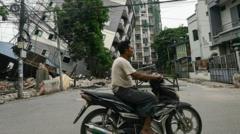Romania’s Constitutional Court’s recent decision to nullify the final round of a presidential election comes amid claims of electoral irregularities. The ruling has raised concerns about political stability within the country, reflecting broader tensions in Europe where right-wing movements are gaining traction.
Romanian Constitutional Court Nullifies Presidential Election Results Amidst Claims of Election Manipulation

Romanian Constitutional Court Nullifies Presidential Election Results Amidst Claims of Election Manipulation
A controversial ruling by Romania's Constitutional Court has led to the annulment of presidential election results, sparking political tensions and accusations of external interference.
The court's abrupt ruling just two days before the scheduled vote aimed to safeguard the electoral integrity of the country. Calin Georgescu, a little-known ultranationalist candidate who had surged to prominence following the first electoral round, is at the center of the controversy that has now led to the annulment. The ruling has incited backlash from right-wing factions, notably George Simion, who claims that a “coup” is underway but called for restraint among supporters.
None of the court's explanations shed light on when the new elections would occur, only stating that the electoral process would be completely restarted. This decision comes in the wake of the government's announcement of uncovered cyberattacks and foreign interference, particularly implicating Russian influence aimed at destabilizing the electoral process.
Prime Minister Marcel Ciolacu supported the court's ruling, deeming it as the correct course of action following revelations regarding Russian meddling that jeopardized the election’s integrity. The announcement by the Supreme Council of National Defense highlighted concerns regarding social unity, stating that the ongoing threats against Romania have put the country on high alert against foreign actors.
Amidst escalating political tensions, the annulment has energized right-wing groups on social media, while traditional political establishments like the ruling Social Democrats perceive it as a step towards securing a fair electoral process. The political landscape in Romania is reflective of broader trends impacting numerous European nations where populist and far-right movements are making significant gains.
The unfolding events in Romania warrant close attention, as they underline not only internal political dynamics but also the external pressures government institutions are currently navigating in the face of increased nationalist sentiment across Europe. The judiciary's role in electoral oversight will continue to test Romania's democratic processes as the country moves forward from this unprecedented decision.
None of the court's explanations shed light on when the new elections would occur, only stating that the electoral process would be completely restarted. This decision comes in the wake of the government's announcement of uncovered cyberattacks and foreign interference, particularly implicating Russian influence aimed at destabilizing the electoral process.
Prime Minister Marcel Ciolacu supported the court's ruling, deeming it as the correct course of action following revelations regarding Russian meddling that jeopardized the election’s integrity. The announcement by the Supreme Council of National Defense highlighted concerns regarding social unity, stating that the ongoing threats against Romania have put the country on high alert against foreign actors.
Amidst escalating political tensions, the annulment has energized right-wing groups on social media, while traditional political establishments like the ruling Social Democrats perceive it as a step towards securing a fair electoral process. The political landscape in Romania is reflective of broader trends impacting numerous European nations where populist and far-right movements are making significant gains.
The unfolding events in Romania warrant close attention, as they underline not only internal political dynamics but also the external pressures government institutions are currently navigating in the face of increased nationalist sentiment across Europe. The judiciary's role in electoral oversight will continue to test Romania's democratic processes as the country moves forward from this unprecedented decision.


















